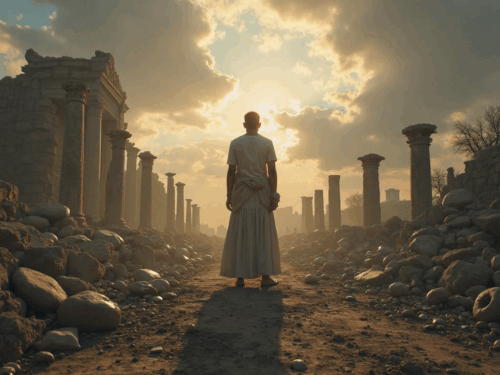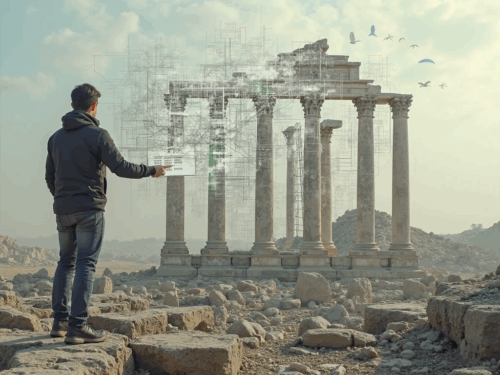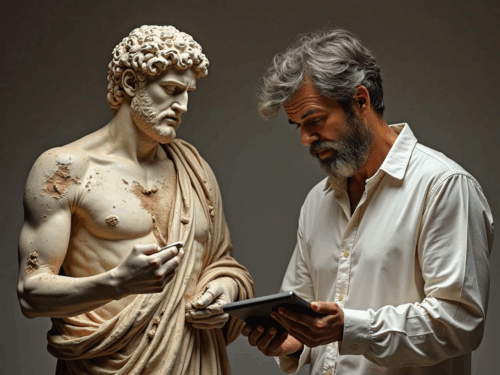History is full of moments so monumental that they reverberate across centuries, shaping societies and redefining the course of civilizations. One such extraordinary event occurred on June 2, 455 AD, when the Vandals, a fierce Germanic tribe led by King Genseric, sacked the great city of Rome. Though this episode was marked by chaos and destruction, it also set in motion a series of transformations that ultimately reshaped Europe. By examining the dramatic fall of a mighty empire, we can uncover timeless lessons in facing adversity, adapting to sudden change, and ultimately emerging stronger on the other side—a guide perfectly applicable to our personal lives today.
## The Dramatic Fall of an Empire
Imagine a city renowned for its splendor, its architectural marvels, and a legacy that had withstood centuries of conquest and political maneuvering. Rome, once the heart of a burgeoning empire, found itself trembling under the weight of internal decay and unchecked external forces. On that fateful day in 455 AD, the Vandals breached the city’s gates, unleashing a relentless assault that shattered not only its marble palaces but also the spirit of an entire civilization. For weeks, the invaders roamed the streets, looting treasures and desecrating sacred sites, leaving behind a landscape of devastation that would forever etch the image of a fallen empire into the annals of history.
What makes this event so historically significant is not just the immediate destruction but the symbolic dismantling of a system that had defined Western civilization for centuries. The sack of Rome was a turning point—a moment that underscored the inevitability of change and the vulnerability of even the most established powers. In witnessing the decline of an empire that once seemed invincible, people both then and now are reminded that impermanence is an inescapable part of life.
## Embracing the Lessons of Chaos
You might wonder how a brutal military campaign from over fifteen centuries ago relates to your personal journey. The answer lies in the universal truths embedded in the ruins of ancient Rome. When an empire as grand as Rome falls, it exposes the raw reality that nothing lasts forever—even the mightiest structures and the most influential legacies. This profound insight can be a powerful catalyst for personal growth. It impels us to acknowledge that change is a constant, and that what seems stable today may transform beyond recognition tomorrow.
In our lives, setbacks and unexpected turns are inevitable. Whether it’s a job loss, a personal crisis, or a sudden change in circumstances, these moments of upheaval can feel as devastating as a city under siege. However, just as the citizens of Rome were forced to confront the fall of their world, you too can use moments of hardship as opportunities to rebuild and reinvent your life. The collapse of an empire serves as a stark reminder that every ending carries the seeds of a new beginning.
## The Beauty of Transformation in Turbulent Times
The destruction wrought by the Vandals was not an endpoint but rather the spark that ignited transformation. In the post-sack period, the remnants of Roman civilization mingled with emerging cultures, ultimately giving birth to new political, social, and artistic movements. In the wake of devastation, creativity found fertile ground. The cultural landscape shifted, laying the foundations for what would become the Medieval era—a time characterized by innovation in art, literature, and governance.
This historical metamorphosis speaks to a fundamental human truth: adversity often acts as a crucible for creativity and renewal. When old paradigms crumble, the void is filled by emergent ideas and fresh perspectives. Think about those moments when you felt overwhelmed by change. Perhaps a significant loss or setback left you feeling disoriented, only to later discover hidden strengths and new opportunities in your personal and professional life. The story of Rome reminds us that we, too, can experience an internal renaissance if we allow ourselves to see challenges as invitations to grow.
## Resilience: The Enduring Spirit in the Face of Adversity
Resilience is more than just a buzzword—it is the quality that enables individuals to bounce back from life’s inevitable hardships. The fall of Rome underscores the importance of resilience in carving a path forward amid chaos. When faced with the unthinkable, the people of a once-mighty empire were forced to reimagine their identity and rebuild their communities. They learned that survival requires not only the ability to endure pain but also the courage to dream of a better future.
For you, resilience might mean the determination to pursue a passion despite persistent challenges or the strength to emerge wiser and more compassionate after a difficult period in life. Every time you stand up after a setback, remember that you are echoing the indomitable spirit of those who rose from the ruins of Rome. The image of a city rebuilt stone by stone, community by community, can serve as a powerful metaphor for personal reinvention. Embrace your setbacks as stepping stones that ultimately lead to a richer, more rewarding existence.
## The Art of Letting Go and Starting Anew
One of the most profound lessons from Rome’s fall is the art of relinquishing what no longer serves you. The mighty empire had once thrived on tradition, pride, and the illusion of permanence. The catastrophic sacking forced its denizens to confront the truth that clinging to outdated notions of identity and security could hinder progress. In the aftermath, there emerged the opportunity to redefine what it meant to be civilized, to embrace new ideas, and to create fresh avenues for cultural expression.
In modern life, the process of letting go is equally vital. Clinging to past successes, grudges, or even outdated self-images can prevent you from exploring innovative paths and reaching your true potential. The destruction witnessed in Rome teaches that there is beauty in starting anew. Life often requires us to unlearn what we once thought was absolute, clearing the way for transformation. Consider a time when letting go of an old habit or relationship paved the way for personal breakthroughs. That moment of courage in releasing the past is your personal renaissance—a testament to your ability to rebuild and evolve.
## Turning Crisis into Opportunity
The unexpected can be scary, but it also creates space for growth and self-improvement. When Rome was sacked, the familiar fell apart, and chaos reigned temporarily. Yet, within that chaos, the seeds of a new order were sown. From the ruins, leaders and visionaries emerged, keen to create systems that would better serve their communities in a rapidly changing world.
Similarly, personal crises present the opportunity to step outside your comfort zone and pursue paths that once seemed unthinkable. When life forces you into uncharted territory, take it as an invitation to learn, adapt, and create. View every “sacking” of your comfort zone as a chance to discover strengths you never knew you had. Instead of being paralyzed by fear or regret, harness that energy to drive you towards innovation and improvement. Your life is a canvas, and every challenge is a brushstroke that adds depth and character to your unique story.
## Lessons on Humility and the Value of Preparation
The Roman Empire’s downfall is a humbling reminder that no matter how high you rise, complacency can invite disaster. The late Roman period was marked by political corruption, economic troubles, and a reluctance to adapt to shifting realities. This hubris contributed significantly to its vulnerability, a lesson that rings true in every sphere of life. Failing to prepare for change or overestimating your invincibility can lead to unexpected downfalls.
On a personal level, this lesson urges you to remain humble and vigilant. Recognize that success, while worthy of celebration, can also breed complacency if it’s not tempered with the wisdom of continuous learning and preparation. Make it a habit to review your goals, update your skills, and stay open to constructive feedback. Much like Rome, whose decline was precipitated by neglecting its internal weaknesses, overlooking your own areas of improvement can stifle growth. Use every moment of success as a stepping stone to further develop your resilience, knowledge, and readiness for the unknown.
## Crafting a Future Inspired by History
One of history’s most enduring gifts is its ability to illuminate our paths forward. The sacking of Rome may be viewed as an unfortunate chapter in medieval history, but it is also a narrative rich with lessons about transformation, resilience, and the relentless human spirit. Rather than seeing destruction as a final verdict, understand it as an outline for rebirth.
Imagine how a capable architect might approach a building left in ruins. Rather than simply mourning the lost glory, they devise innovative designs to create something even more magnificent from the debris. This perspective is essential for personal growth. Every challenge you face is an opportunity to redesign your future, to construct a version of your life that is more aligned with your evolving aspirations.
When you encounter a setback—whether at work, in relationships, or personal ambitions—see it as a chance to innovate. Treat the inevitable “destruction” in your life not as the ultimate end, but as the ground zero for a new beginning. Just as the collapse of an empire gave rise to a new era defined by creativity and fresh perspectives, your failures can ignite a period of unprecedented personal innovation. Cultivate an attitude that embraces change, sees failure as a lesson, and remains unwavering in the pursuit of a better self.
## Practical Takeaways for Your Personal Journey
So, how can you practically apply the lessons from Rome’s sacking to your daily life? Here are a few actionable strategies to turn historical inspiration into tangible personal growth:
- **Acknowledge Impermanence:** Understand that all things—good and bad—are temporary. Embrace the idea that change is inevitable, which can help you remain calm and adaptable during turbulent times.
- **Cultivate Resilience:** Develop habits that build mental and emotional toughness. This might include mindfulness practices, regular self-reflection, and surrounding yourself with supportive communities that encourage growth.
- **Embrace Lifelong Learning:** Never assume you have reached your peak. Continuously invest in your personal and professional development. Learn new skills, update your perspectives, and remain curious about the world around you.
- **Let Go of Outdated Beliefs:** Regularly assess whether certain habits or mindsets are holding you back. Be willing to discard ideas that no longer align with your evolving vision, creating space for fresh experiences and opportunities.
- **Reframe Setbacks as Opportunities:** When things don’t go as planned, ask yourself what new opportunities might emerge from the challenge. Consider setbacks as invitations to innovate and refine your approach to life.
- **Plan for the Future with Humility:** Celebrate your successes, but never let them lull you into complacency. Develop contingency plans and remain mindful of potential areas for improvement in every aspect of your life.
- **Focus on Community and Connection:** Just as the ruins of Rome eventually fostered a rich blend of cultures and ideas, your own network of relationships can be a catalyst for growth. Lean on mentors, friends, and family during times of change—they can offer guidance, support, and renewed perspectives.
## Inspiring Your Own Renaissance
The journey from the downfall of a vast empire to a vibrant, renewed cultural landscape is one of history’s most captivating stories. It reminds us that even in the face of profound loss, there is always the potential for a transformative rebirth. Every time you experience a setback, look to the past for inspiration. See the unexpected twists and turns of your life as the universe’s way of directing you toward an even greater destiny.
By internalizing these lessons, you not only honor the historical significance of events like the sacking of Rome but also empower yourself to build a more resilient, creative, and fulfilling future. Embrace the reality that your current circumstances—no matter how difficult—are not the final chapter. They are merely the prelude to a future where you have the opportunity to construct something enduring and extraordinary. In the ruins of your challenges, gather the raw materials of experience, wisdom, and courage, and begin to build anew.
Lastly, remember that history is not a distant relic confined to dusty tomes. It is a living, breathing tapestry of human triumphs and tribulations that continues to influence every moment of our lives. Each setback, like that of ancient Rome, carries with it the promise of reinvention and renewal. Use this understanding as a daily source of inspiration. Allow the echoes of the past to propel you forward, reminding you that true strength is forged not in the absence of adversity, but through the enduring commitment to rise again.
## A Call to Embrace Your Inner Architect
Today, as you navigate through your personal challenges and triumphs, take a moment to reflect on the lessons that history offers. Recognize that just as the city of Rome was rebuilt from its ruins, your own life is a continuous work in progress. Every experience, every obstacle, and every moment of despair is a building block for the magnificent structure you are creating.
Harness the spirit of transformation that once redefined an entire era. Use setbacks as stepping stones and view each challenge as an opportunity to reshape your destiny. Whether you are striving for personal growth, professional success, or a deeper connection with those around you, let the ancient story of a fallen empire inspire you to construct a life marked by resilience, courage, and endless possibility.
Let history be your guide and motivation. Embrace change wholeheartedly, knowing that from every ending emerges the chance to start something truly remarkable—a personal renaissance that reflects the timeless power of the human spirit.
—
In the ever-changing narrative of our lives, remember that the power to rebuild, transform, and emerge even stronger resides within you. Let the lessons from the tragic yet transformative fall of Rome remind you that every challenge is an opportunity waiting to be seized. Build your future with passion, guided by the insights of history, and step confidently into the boundless potential of tomorrow.
May you find strength in adversity, inspiration in transformation, and courage in the knowledge that like Rome, you too can rise from the ashes to create a legacy uniquely your own. Enjoy your journey of renewal, and let every new day be a canvas for a bold, innovative masterpiece.
—
By reflecting on one of history’s most dramatic turning points, you can gain insights that enhance every aspect of your life. Next, consider exploring other moments in history that mirror current challenges—perhaps the fall of the Soviet Union or the transformative Renaissance period—and learn how those eras of change continue to influence ideas of creativity, resilience, and renewed purpose today. Whether you are rekindling a passion for learning or seeking motivation to overcome personal obstacles, history’s enduring lessons are waiting to be discovered anew in each moment of your extraordinary journey.

